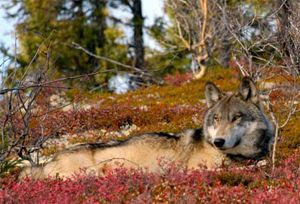Wolf experts and scientists from Canada, USA and Russia, along with researchers, students, conservationists, eco-tour operators and others will gather at the First International Wolf & Carnivore Conference, which takes place in Thompson, Manitoba on Oct. 23-24, 2012.
Churchill Wild will be represented by North Knife Lake Lodge founder Doug Webber, who has spent most of his life in Churchill, Thompson and the surrounding Manitoba wilderness. North Knife Lake Lodge has been home to more than one family of wolves for almost 40 years, and along with taking fishing guests on hikes to view the wolves, Webber has also assisted wolf researchers on numerous occasions.
The main organizer of the conference, Volker Beckmann, is hoping that the conference will help to transform Thompson into the Wolf Capital of Canada.
“Wolves should be seen as an ecological and economic asset, similar to the way polar bears and beluga whales are to Churchill,” said Beckmann in a recent Winnipeg Free Press article entitled Wolves Pack them in.
“In northern Manitoba, wolves can attract researchers and tourists, provide new income and business opportunities, and create positive publicity for Thompson and Manitoba if managed and marketed properly. Thompson could link itself as the wolf capital to the polar bear capital in Churchill for eco-tourism efforts. There’s great potential.”
Main Themes of the Wolf & Carnivore Conference:
- Wolf Ecology, Management and Policies
- Wolves and Polar Bear Dynamics along the coast of Hudson Bay
- Defining a Wolf/Carnivore Centre of Excellence
- Current and future Wolf Research Projects in unstudied regions
Invited Presenters and Keynote Speakers include:
Rick Baydack, CWB
Rick Baydack is a Professor at the University of Manitoba, Clayton H. Riddell Faculty of Environment, Earth, and Resources, Department of Environment and Geography, in Winnipeg, Manitoba, Canada. He is also the Canadian Section Representative to The Wildlife Society Council. His principal professional interests are practical management applications for wildlife and their habitats, using an ecosystem approach and adaptive strategies. Baydack will be focusing on how wolves and their prey, woodland caribou, are affected by northern development.
L. Dave Mech (tentative)
L. David Mech (pronounced “Meech”) is a Senior Research Scientist with the Biological Resources Division, U.S. Geological Survey and an Adjunct Professor in the Department of Fisheries, Wildlife and Conservation Biology, and Ecology, Evolution and Behavior at the University of Minnesota. Mech has studied wolves and their prey since 1958, as well as several other species of wildlife.
Marco Musiani
Marco Musiani is an Associate Professor, Tenured with the Faculties of Environmental Design and Veterinary Medicine at the University of Calgary. He is currently analyzing ecological data on large carnivores (example, wolves) and their prey, which was gathered throughout Northern and Western Canada. He has published two books on wolves.
Nikita G. Ovsyanikov
Nikita G. Ovsyanikov is the Deputy Director for science and senior research scientist, Wrangel Island State Nature Reserve, Ministry of Nature Resources, Russian Federation and Senior Research Scientist, Severtzov’s Institute of Problems of Ecology and Evolution, Russian Academy of Sciences. Ovsyanikov has studied the population, condition, and behavior of polar bears on Russia’s Wrangel Island for more than 15 years. The remote island is one of the largest polar bear denning sites in the world and has seen significant changes in the sea ice in recent years. In addition to scientific papers, he is the author of “Polar Bears: Living with the White Bears.”
Paul Paquet
Paul Paquet, Ph.D. is an Adjunct Professor of Biology and Associate Professor of Environmental Design at the University of Calgary. He is also an Adjunct Professor at University of Saskatchewan College of Veterinary Medicine, Brandon University, University of Manitoba; and Faculty Associate at Guelph University and University of New Brunswick. Paquet, who has studied wolves and coyotes for more than 35 years, obtained his PhD degree from the University of Alberta, Canada. He is an internationally recognized authority on mammalian carnivores, especially wolves, with research experience in several regions of the world.









